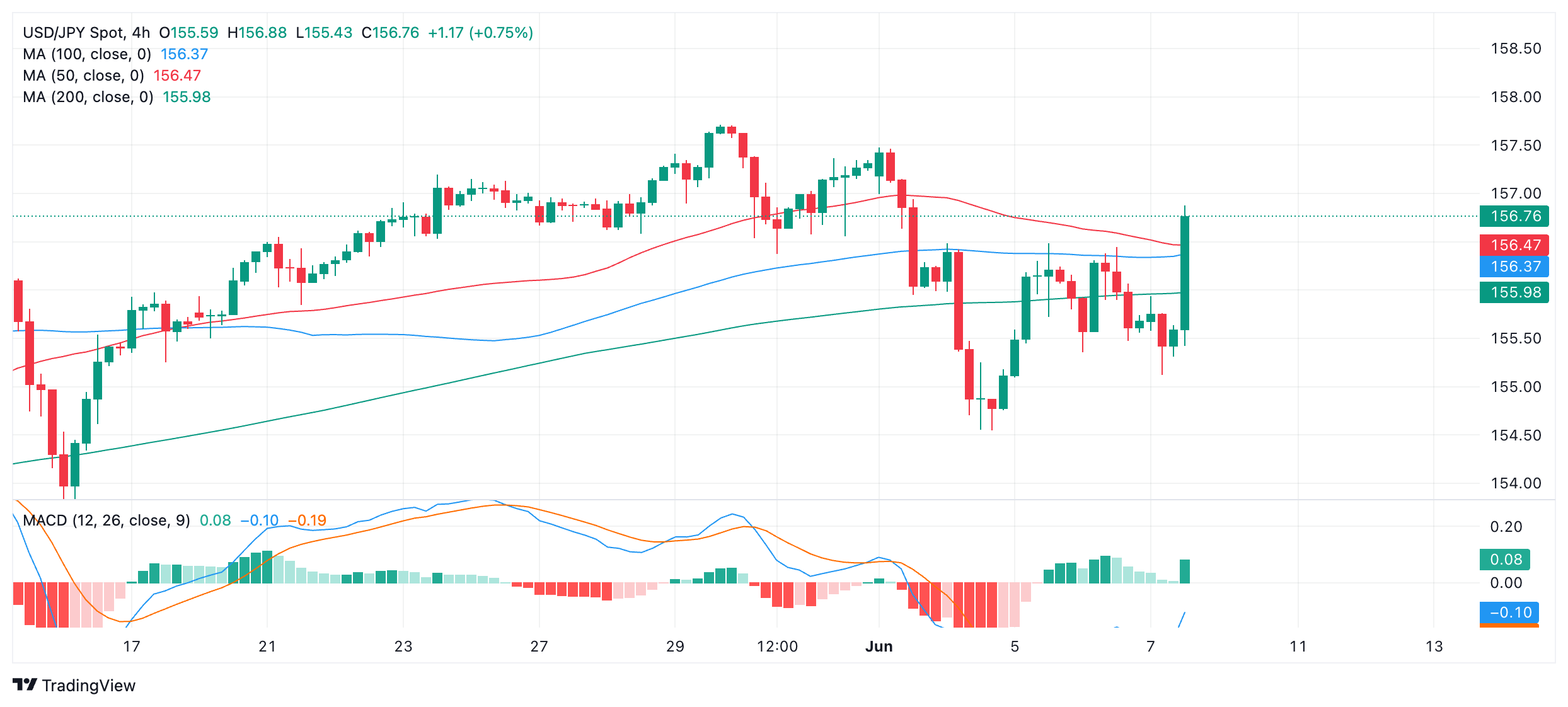- USD/JPY rises more than half a percentage point following stronger-than-expected May NFP numbers.
- The data also showed a larger-than-expected rise in wages, although unemployment rose unexpectedly.
- The data contrasts with Japanese real wages, which fell for the 25th consecutive month in April.
USD/JPY rises more than half a percentage point in the minutes following the release of US Non-Farm Payrolls (NFP) data on Friday. USD/JPY trades above 156 after the US Dollar (USD) strengthened as a result of better-than-expected results.
US Nonfarm Payrolls showed that the number of people employed in the US increased by 272,000 in May when 185,000 were expected, according to data from the US Bureau of Statistics (BLS). The result was higher than the April figure, which was revised downwards to 165,000.
USD/JPY Daily Chart
He BLS report showed an increase in average hourly earnings of 4.1% year-on-year, beating estimates of 3.9% and higher than the upwardly revised 4.0% in April.
The report showed that the unemployment rate rose to 4.0%, however, it had been forecast at 3.9% from 3.9% previously.
Overall, the data suggests that the US labor market is doing better than previously thought, especially given the JOLTS job openings data and the lower-than-expected ADP numbers earlier in the week. Higher-than-expected wage inflation indicates the possibility that headline and core inflation could rise as workers spend their increased wages. Higher headline inflation could deter the US Federal Reserve (Fed) from lowering interest rates. Before the release of the NFP, the probability that the Fed would cut interest rates in September was about 67% – after the NFP it had fallen to 53%.
Maintaining high interest rates is positive for the USD/JPY as it strengthens the US Dollar. A higher interest rate attracts greater flows of foreign capital, increasing demand for the currency.
USD/JPY further boosted by contrast with Japanese wage data
The strong move higher in USD/JPY following the NFP data may be exaggerated because it follows two minor negative US jobs reports earlier in the week (JOLTS and ADP) and because of the contrast with similar data from Japan .
Real wages in Japan declined for the 25th consecutive month in April, as domestic inflation continued to outpace wage growth. The data makes it difficult for the Bank of Japan (BoJ) to normalize its monetary policy. The BoJ is the only major central bank still carrying out quantitative easing (QE) and has had to keep interest rates in an ultra-low range of 0.0% – 0.1%. This has led to a marked devaluation of the Yen to levels that are worrying policy makers as they are hampering business activity.
That said, USD/JPY lost ground earlier in the week amid rumors that the BoJ was planning to reduce the bond purchases it carries out as part of its QE program. If the BoJ reduces bond purchases, it would put upward pressure on Japanese bond yields, which are highly correlated with the JPY. However, it remains to be seen if the rumors materialize.
The rise of USD/JPY may be limited by the direct intervention of the Japanese authorities to buy Yen in the currency markets. On Tuesday, BoJ Deputy Governor Ryozo Himino repeated concerns about how a weak JPY was negatively impacting the economy and that the BoJ needed to be “very vigilant” about its effects. His comments suggested that the BoJ could be preparing for another direct intervention in the currency markets to prop up the JPY (negative for USD/JPY).
According to Himino, the weak Yen drives inflation, but in a negative way. Although the price of imported goods increases, stagnant wages continue to mean that consumers are increasingly being excluded from the market. Himino said he would prefer inflation to come from higher wages, not a weak currency, as this would lead to a more dynamic economy.
Source: Fx Street
I am Joshua Winder, a senior-level journalist and editor at World Stock Market. I specialize in covering news related to the stock market and economic trends. With more than 8 years of experience in this field, I have become an expert in financial reporting.








